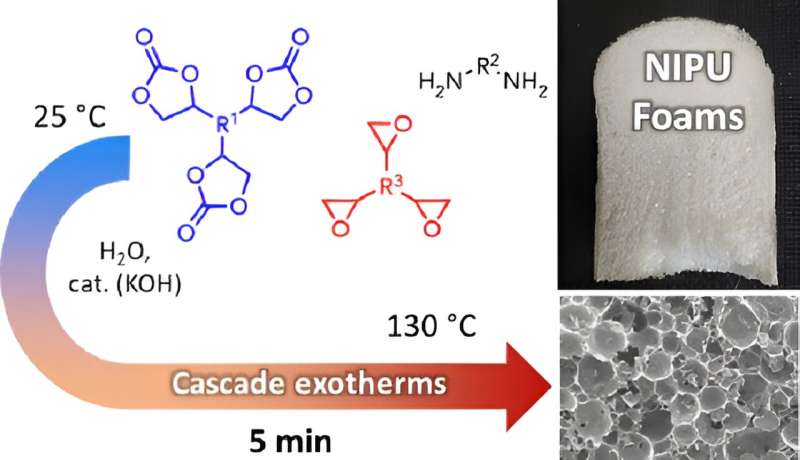This article has been reviewed according to Science X's editorial process and policies. Editors have highlighted the following attributes while ensuring the content's credibility:
fact-checked
peer-reviewed publication
trusted source
proofread
Rapid production of isocyanate-free, biobased polyurethane foams at ambient temperature

Researchers from CERM (Center for Education and Research on Macromolecules) at the University of Liège have just developed an innovative process for producing isocyanate-free, recyclable and biobased polyurethane (PU) foams by using a rapid foaming technology from room-temperature formulations.
This innovation offers a cutting-edge alternative to the traditional process based on toxic isocyanates. The study is published in the Journal of the American Chemical Society.
Polyurethane foams (PU), produced for decades by the toxic isocyanate chemistry and currently under strict restrictions on use, are still essential materials in our everyday lives. Rigid PU foams are major actors in the drastic reduction of our energetic needs when used as thermal insulating panels in floors, walls and roofs, as well as in refrigerator doors. In their flexible versions, the foams are mainly used for comfort applications in mattresses, sofas, car seats and soles of sports shoes, but also for acoustic insulation or shock absorbing materials.
Although various PU recycling strategies are currently being developed, the end-of-life management of PU foams remains problematic. In addition, many customers of the foam sector are looking for isocyanate-free and ideally bio-based materials. Researchers are intensively searching for alternatives for producing the foams by exploiting locally available resources while rendering them easy to recycle. Developing such circular and more sustainable foams represents a major challenge, especially when the retrofit of existing industrial foaming infrastructures has to be considered.
"In 2022, we introduced the first recyclable isocyanate-free polyurethane foam (NIPU) manufacturing process using water to produce the foaming agent (CO2), the simplest and most economical system ever reported," explains Christophe Detrembleur, chemist at the CERM (Center for Education and Research on Macromolecules).
"This technology mimics the foaming of conventional PUs, but without using toxic isocyanates. It is based on the use of water and a catalyst added to the formulation composed of cyclic carbonates and amines. Part of the cyclic carbonates is transformed into the blowing agent (CO2) which expands the matrix, and the other part contributes to its formation and hardening."
Since this foaming process requires a thermal treatment to occur it is very well suited to the manufacture of NIPU foams in heated molds, i.e., for complex-shaped foams (car seats, shoe soles, etc.). However, it is not adapted to the rapid foaming at room temperature demanded by many foam producers.
"In a new research project, for which a patent has just been filed, we are demonstrating how this process can produce NIPU foams from room-temperature formulations in record time, still using water to generate the foaming agent," explains CERM researcher Maxime Bourguignon. "The idea is to create cascade reactions that spontaneously and rapidly generate, thereby speeding up the manufacture of the NIPU matrix and its foaming by mimicking the traditional isocyanate-based process.
"Virtually all applications of PU foams, both rigid and flexible, can therefore be envisaged using this technology, without requiring the use of an external heat source for their manufacture. What's more, foams with a high biobased content (70%–90%) can easily be produced in less than two minutes."
This innovative technology is simple, modular, robust and very easy to implement. "All that remains now is to convince PU foam producers, who are very conservative, to use this process for producing the next generation of foamed materials that are expected to answer the new legislative requirements, social needs and our sustainability imperatives," concludes Detrembleur.
More information: Maxime Bourguignon et al, Cascade Exotherms for Rapidly Producing Hybrid Nonisocyanate Polyurethane Foams from Room Temperature Formulations, Journal of the American Chemical Society (2023). DOI: 10.1021/jacs.3c11637
Journal information: Journal of the American Chemical Society
Provided by University de Liege




















